“Don’t just criticise, create! #1” - Interview with Alvino-Mario Fantini
This is the first instalment of our new interview series called: “Don’t just criticise, create!” David Engels speaks with European artists, philosophers, priests, intellectuals, activists, and artisans who have each decided not only to lament 'the decline of the West' but also to endeavour to help reverse it. They have done this by making something new, and also perhaps something beautiful, true, and good.
David Engels: You are the editor-in-chief of The European Conservative, Europe’s leading online and print periodical for political, cultural, and philosophical questions analysed from a “conservative” point of view. What does “conservative” mean for you?
Alvino-Mario Fantini: I intentionally use the word “conservative” in a broad and purposefully provocative way. While I certainly come from a fusion of various conservative traditions and influences, I would not call myself an American “fusionist.” The way that I use the word “conservative” here and now — that is, the way that I understand it when thinking of or speaking about the project of The European Conservative — is as a catch-all phrase that embraces or welcomes various centre-Right movements and schools of thought.
More simply put, I like to say that the word refers to everything that is NOT on the Left, that is not influenced or infected by progressive or left-liberal thought. (I like to refer people to a table that the late great Austrian thinker Erik von Kuehnelt-Leddihn once prepared showing the basic difference between Left and Right.)
Of course, this is all thrown into question when one acknowledges the changes taking place on the Right in recent years, and the move away from a simple “Left-Right” dichotomy or antagonism to one that is more about the struggle between corrupt managerial or globalist ruling class versus the common good and local traditions of “the people.” That shift from one form of struggle to another, however, is a separate though equally important matter that should be discussed elsewhere.
So, I think “conservative” refers to that broad and multifaceted tradition that seeks to preserve the classical inheritance, the Judeo-Christian tradition, the spirit of Christian humanism, Matthew Arnold’s “best that has been thought and said”, and many other expressions of that civilizational thrust that — essentially — seeks to displace barbarism wherever it rears its ugly head.
After having defined “conservative”, what does “Europe” mean to you? Is it, as so many nationalists claim, merely a geographical designation whose common identity is an invention by Brussels?
This is a wonderful question for all of us to continually ponder and think about! As someone raised multilingually and with different cultural traditions, I have long been fascinated with questions of identity, and community and belonging. And I think the question of “what is Europe?” is basic, essential, fundamental for all of us who are inheritors of the Western Tradition — something which extends from Europe to parts of Asia and Africa.
I think those who seek to reduce this idea of “Europe” to a mere Brussels construct, as well as those who deny that there is anything that is “Europe”, both ignore a long tradition. There is, as many of us know, a long, rich tradition of thinking about this Continent — and its extensions overseas — as a distinct thing. Europe is not just a multilateral political entity — and I believe that meditating on this and trying to understand what features define it is one of the many intellectual pleasures one can enjoy. Seeking to also, then, take necessary action to preserve it, once understood, is a subsequent challenge — one which faces us today.
What are today’s main enemies of conservatism in Europe? And how can we best hold our ground — apart from politics?
I prefer to think of the question in this way: who are the principal enemies of civilization today, in Europe and elsewhere?
Those enemies are legion. Most generally, I think we can distinguish between internal and external threats, which can range from our cultural elites, and our media and entertainment industries, in the case of the former, and progressive transnational networks, in case of the latter. I think that there are so many diagnoses of the character, nature, and shape of these threats that have appeared over the past century — think of De Lubac, Fabro, Del Noce, Knox, Corrêa, to name but a few — that any attempt on my part to make my own list of the threats to civilization would fall miserably short.
The EuroCon has quite a movement and history behind it. I still remember seeing my first articles published in it, when it was very clear that it was inexperiencedly typeset and published in very low numbers. Today, it has become a major quarterly publication present in many airports and bigger European bookshops and newsstands like W.H. Smith. Could you retrace this history of success for our readers?
Born on the side-lines of one of the annual Vanenburg Meetings, the publication appeared first as a 4-page newsletter for participants of this meeting. I became volunteer editor with Issue No. 6 and, insufficiently challenged at my day job, I began to experiment with it: by adding pages, starting new features, giving it a cover image, and sending it out as a PDF. When possible, I also printed a limited number of copies to take to events. I like to sometimes refer to it as early Right-wing samizdat.
Then, it began to get noticed — first by the late David Kennedy of the Earhart Foundation, then by Lord Daniel Hannan, when he was Secretary General of the Alliance of Conservatives and Reformists in Europe (ACRE), and then by other future partners and associates.
Eventually, I decided to start a non-profit organization — first in Vienna and then in Budapest, which seemed appropriate given my interests in the Dual Monarchy of the Habsburgs — so that I could make more formal some of the extracurricular activities I was increasingly involved in. The result of this long and winding process was that I was able to publish The European Conservative, with distribution out of London, and with a team of editors and writers and analysts that range from Wyoming to Wallonia, and nearly everywhere in between.
The European Conservative aims to rally the most different groups and currents within the political Right all over the continent. Given the very different, often contradictory, national and ideological movements within the European Right, this task may seem Sisyphean. We all remember Bannon’s failure to unite European conservatives in a federation (called “The Movement”), and we all recognize the current difficulties in unifying the different groups at the European Parliament. How do you assess the advantages and difficulties of such an undertaking?
I would disagree with that assessment of what our purpose is, since realism must be at the core of any conservative undertaking. What I mean by this is that our purpose is less about uniting the Right and more about exploring the Right in all its many reputable — and sometimes disreputable expressions and manifestations — seeking to identify those factors or features which are common among them.
Putting it differently, I would say that the aim of our project is to explore and understand conservatism, the Right, reactionary and traditionalist thought across the many countries and regions of Europe — though we also are proud that our interests extend around the world: to the Americas, especially Latin America, as well as to Japan, to name but a few non-European examples.
If, in the course of doing all this, which is fundamentally academic and journalistic work, we create new alliances or help foment partnerships or collaborative arrangements — or even if a ‘movement’ arises from this work — flowing out of our efforts to make one group in one part of Europe aware of the work and activities of another group somewhere else in Europe, then we will feel doubly proud. But the aim is primarily an intellectual one.
Though you are based in Vienna, The European Conservative is itself based in Budapest, which has become something of the capital of European conservatism in recent years. This provides an opportunity for the establishment of a pan-European “common ground” for conservatism. This may all be put at risk, however, when the Hungarian government changes. How do you see the political and ideological position of Hungary — and its future — within the context Europe?
I am fascinated with Hungary, as I see it as punching well above its weight in what we can broadly call the culture wars. With barely 10 million inhabitants, I think in many ways it has become a model nation for all of us, with its grit and determination, its pride and embracing of traditional culture and values, and its determination to undo the damage and remove the toxicity of so many years of rule under Fascist and Communist regimes. One has to marvel at what it has achieved, when one considers where it was 15 or 25 years ago, and where it is now.
I also think it is a scandal that no other Western European country dares or is capable of exhibiting the kind of courage and determination and strict adherence to values that Hungary has shown. It is outrageous that France and the UK, America and Germany, Canada, are all in the vanguard of pushing woke ideology and the worst, most vile, most aberrant forms of behaviour and lifestyles — and that they do nothing at all to defend the rights of dissenters and minority opinions. Liberal-left progressivism has become the ruling dominant power across the West and its exponents rule like petty tyrants.
The title The European Conservative clearly refers to the nearly homonymous journal The American Conservative, and you yourself have American origins, as do some of your contributors. And yet, anti-Americanism is rampant in European conservative circles — not always because of the current ‘wokism’ but also because of the massive and detrimental influence of U.S./American popular culture on Europe. Is there a possibility to overcome these divisions — and if so, how?
I think if there is one thing that everyone learned in 2016 — with the Brexit vote and the election of Donald Trump — is that there is a growing audience out there across political and geographic boundaries who are experiencing and feeling the same. One can see this also with the protests of the gilets jaunes and the Dutch farmers, two other expressions of growing or simmering populist nationalist anger that I think presages greater tumult and social convulsions in the coming years.
When one adopts anti-American rhetoric, I think it is important to then also ask which America one is opposed to, since there are at the very least two Americas. There is, on the one hand, an imperialist America that seeks the universalization of habits and practices that should, at best, remain localized and particular, and there is, on the other hand, an America that is reawakening, that seeks to rediscover its own local roots, and that recognizes the corrosive effects of the mass media and the mass entertainment industry, and the corrosive effects of mass commercialism upon the soul.
Sadly, as I think you know, this is what is most often globalized and universalized, and which is the detritus and garbage that most usually gets exported to other countries around the world. If that is the America we are talking about, then I think conservatives of all kinds and from all traditions will agree that we need to push back against it. And, in my case, with an Italian-American father and a South American mother born in Italy, it is something with which I was raised — that is, a healthy suspicion of the commercial, materialistic narrative that too often dominates and displaces healthier and more humane, I might even say poetical, modes of experience.
What is in play today, in Europe and in the Americas in Latin America and in other parts of the world, is really the struggle between these two forms of existence — which is really the struggle to live according to deep-seated and long-standing traditions, with all the accoutrements of culture that accompany them. Additionally, there is the increasingly difficult task of defending and protecting the core of all societies, which is the family, which has a traditional marriage at its core. And this is also at the core of all those other struggles worldwide.
I hasten to add one final thought: that we must remember that all of this must necessarily take place and develop in the rich context of European civilization, which is that brocaded embroidery that emerges from a long and intricate thread of influences, and movements, and phases of human existence — the organic development of a civilizational stream that stems from, absorbs, and issues forth from Assyrian, Babylonia, Greco-Roman, Judeo-Christian periods, and extends into the Dark Ages of our day.
The European Conservative is now expanding. You just opened an office in Brussels. Can you tell us a bit more about your future projects?
We opened up an office in Brussels in January, from which we plan to expand and fortify our news coverage, particularly of events in Brussels and within the European Union and its various agencies. We find that too much news today does not report on issues and matters that are of most concern to conservatives, broadly defined, so we also hope to fill a gap that we have identified in the media landscape in Europe.
This Brussels office will not only produce news and analytical content, it shall also serve as a sort of “core hub” for other educational, political, and networking activities. We plan to have regular meetings and gatherings, invite speakers and host book launches, perhaps even hold seminars and workshops, etc.
We also plan to expand our offering of audio-visual content, and we hope to offer short-term journalism or media fellowships to distinguished writers and scholars who may want to do a deep-dive into a particular topic. Additionally, we hope to continue serving as an inspiration for other up-and-coming editors and writers, and inspire the creation or launching of new platforms and new periodicals across Europe. We are, in this sense, here for the sake of others.
Finally, we hope to begin to publish monographs and books, bringing back into circulation publication which may be out of print or lost or forgotten, and we even hope to start producing well-curated and well-designed ‘swag’ — from playing cards and puzzles, to hats, scarves, and ties, to small statues and busts of important figures, as well as stickers, notecards, and posters. Who knows: we may even someday be able to roll out a series of ‘action figures’ or dolls of famous personalities, inspired as I am by dolls and figures I happen to own of Japanese Prime Minister Ryutaro Hashimoto, Archduke Karl von Habsburg, Churchill, Reagan, and Thatcher. Believe it or not, there is a huge demand for this kind of material!
The motto of this interview series is: “Not only criticise, but also create!” Can you identify with that — and if so, how?
Absolutely. I come from a creative background and have always been bored to tears by activism and lobbying, and pressure groups and political campaigns. I think much of those efforts can be quite ineffective and perhaps rewarding of the influence peddling through largesse, which repels me.
What I do know, however, is that the products born of the creative act — that is, poems and stories, books and drama, music and songs, art and cinema — have a far greater reach and leave a deeper impact than anything else. That is why I so profoundly understand and agree with Dostoevsky’s oft-quoted statement that “beauty will save the world.” I think we on the Right need to do less politicking and canvassing, less lobbying, and instead do more creative work, producing things to fill in the painful artistic, literary, and visual gaps in our world, replace the brutalism and urban horrors of our artists and architects and planners, and make up for the damage wrought on our culture — for the political is rooted therein.
Read also
'Don't Just Criticise, Create!': Interview with Andreas Lombard - Member of the Executive Board of the Thomas Hoof Group
Dear Mr Lombard, most readers undoubtedly still know you as the editor-in-chief of the magazine "Cato - Magazin für neue Sachlichkeit" (Cato - Magazine for New Objectivity), which you helped to achieve a real cult status in the German media landscape between 2017 and 2021.
David Engels
'Don't just criticise, create!': Interview with Francesco Giubilei, founder and director of “Nazione Futura”
This is the ninth instalment of our new interview series, called “Don’t just criticise, create!” David Engels speaks with European artists, philosophers, priests, intellectuals, activists, and artisans who have each decided not only to lament 'the decline of the West' but also to endeavour to help reverse it.
David Engels
'Don't Just Criticise, Create!' Interview with Antoine Dresse - Creator of the Channel “Ego Non”
This is the tenth instalment of our new interview series called, "Don't just criticise, create!" David Engels speaks with European artists, philosophers, priests, intellectuals, activists, and artisans who have each decided not only to lament 'the decline of the West' but also to endeavour to help reverse it.
David Engels
“Don’t just criticise, create!” Interview with Gerd Morgenthaler, member of the “Network for Academic Freedom”
This is the third instalment of our new interview series called, “Don’t just criticise, create!” David Engels speaks with European artists, philosophers, priests, intellectuals, activists, and artisans who have each decided not only to lament 'the decline of the West' but also to endeavour to help reverse it. They have done this by making something new, and also perhaps something beautiful, true, and good.



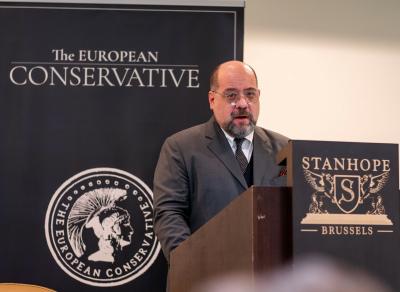

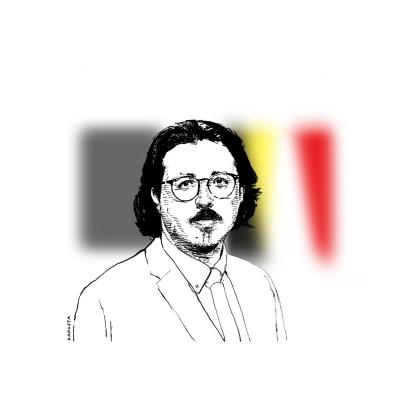


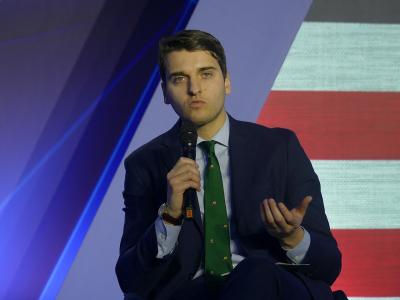

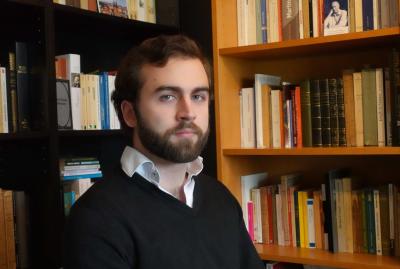

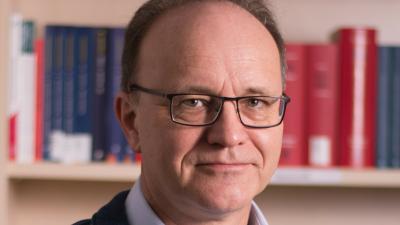

Comments (0)